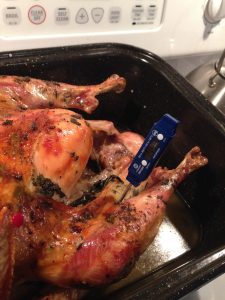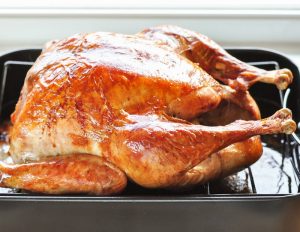
Lets get the food safety science right at Thanksgiving



In the run up to the beginning of the five-week orgy of food and shopping in the U.S. known as Thanksgiving, the U.S. Centers for Disease Control and public health and regulatory officials in several states are investigating a multistate outbreak of multidrug-resistant Salmonella infections linked to raw turkey products. The U.S. Department of Agriculture’s Food Safety and Inspection Service (USDA-FSIS) is monitoring the outbreak.
 Seventy-four more ill people from 26 states were added to this investigation since the last update on July 19, 2018.
Seventy-four more ill people from 26 states were added to this investigation since the last update on July 19, 2018.
As of November 5, 2018, 164 people infected with the outbreak strain of Salmonella Reading have been reported from 35 states.
63 people have been hospitalized, and one death has been reported from California.
Epidemiologic and laboratory evidence indicates that raw turkey products from a variety of sources are contaminated with Salmonella Reading and are making people sick.
In interviews, ill people report eating different types and brands of turkey products purchased from many different locations. Three ill people lived in households where raw turkey pet food was fed to pets.
The outbreak strain has been identified in samples taken from raw turkey pet food, raw turkey products, and live turkeys.
 A single, common supplier of raw turkey products or of live turkeys has not been identified.
A single, common supplier of raw turkey products or of live turkeys has not been identified.
The outbreak strain of Salmonella Reading is present in live turkeys and in many types of raw turkey products, indicating it might be widespread in the turkey industry. CDC and USDA-FSIS have shared this information with representatives from the turkey industry and asked about steps that they may be taking to reduce Salmonella contamination.
Always handle raw turkey carefully and cook it thoroughly to prevent food poisoning. This outbreak is a reminder that raw turkey products can have germs that spread around food preparation areas and can make you sick.
CDC is not advising that consumers avoid eating properly cooked turkey products, or that retailers stop selling raw turkey products.
CDC advises consumers to follow these steps to help prevent Salmonella infection from raw turkey:
Wash your hands. Salmonella infections can spread from one person to another. Wash hands before and after preparing or eating food, after contact with animals, and after using the restroom or changing diapers.
Cook raw turkey thoroughly to kill harmful germs. Turkey breasts, whole turkeys, and ground poultry, including turkey burgers, casseroles, and sausage, should always be cooked to an internal temperature of 165°F to kill harmful germs. Leftovers should be reheated to 165°F. Use a food thermometer to check, and place it in the thickest part of the food.
Don’t spread germs from raw turkey around food preparation areas. Washing raw poultry before cooking is not recommended. Germs in raw poultry juices can spread to other areas and foods. Thoroughly wash hands, counters, cutting boards, and utensils with warm, soapy water after they touch raw turkey. Use a separate cutting board for raw turkey and other raw meats if possible.
Thaw turkey in the refrigerator, in a sink of cold water that is changed every 30 minutes, or in the microwave. Never thaw your turkey by leaving it out on the counter.
CDC does not recommend feeding raw diets to pets. Germs like Salmonella in raw pet food can make your pets sick. Your family also can get sick by handling the raw food or by taking care of your pet.
Now they’re citing my lab in Turkey.
OK, I had a bunch of qualified people, and I’m putting the band back together to write a book.
These Turkey folks don’t know shit.
Neither do lots of others.
The purpose of this study is to examine the food safety knowledge of foodservice staff in fast-food restaurants in a Turkish context. Data for this empirical investigation was gathered from a sample of full-time foodservice staff at the different fast-food restaurants in Ankara/Turkey. Respondents self-administered the questionnaires. The total number of 165 questionnaires was obtained in the research location. Results based on the descriptive statistics, staff works in fast food restaurants in Ankara are not knowledgeable on foodborne/food poisoning and the training rate is not at the satisfactory level. In addition, t-test result demonstrates that female respondents are more knowledgeable compared to males. This paper provides implications for managers in terms of minimising the negative effects of foodborne diseases and maximising the employees’ food safety knowledge in a service setting where the food industry is increasing. Theoretically, the current study by examining the food safety knowledge of restaurant staff and providing insights into the foodborne disease in a developing touristic destination lends further contribution to the related literature.
Assessing the food safety knowledge of fast-food restaurant staff in Ankara/Turkey: some strategies from managerial approach
Middle East Journal of Management, https://doi.org/10.1504/MEJM.2018.095583
Kerem Kaptangil, Mustafa Daskin
https://www.inderscienceonline.com/doi/abs/10.1504/MEJM.2018.095583
Washing chicken or turkey for that matter is a cross-contamination nightmare. Cook your bird to 74C (165F) and verify with a digital tip sensitive thermometer. No need for washing. If you’re in Canada, the temperature to inactivate Salmonella mysteriously jumps to 82C (180F) for whole poultry, depending on the jurisdiction.
No wonder the public gets confused.
It is true that people are what they eat. The foods we eat say a lot about our general body’s health. However, before eating any food, people are always advised to wash them, even before
cooking. However, did you know that there are some food types you don’t need to wash before cooking? Well, there are some foods you will wash before cooking while others should just be cooked straight away. Here are three major foods you should never wash before cooking:
Chicken
Washing chicken before cooking it is very wrong. People think rinsing a chicken removes germs and bacteria from it, which is never true. Salmonella, which commonly grows on chicken will only be killed when chicken is cooked at temperatures above 165 degrees. Washing it does nothing good for the chicken.
Eggs
Many people tend to wash eggs before breaking them to cook. However, this is just a waste of time as eggs have their own protective layer that prevents any bacteria from getting inside. More so, washing the eggs might remove this protective layer exposing them to contamination which will make them go bad faster.
Fish
People think washing fish will remove any bacteria on it. Washing fish will only be robbing it of its flavor. Just like the bacteria in chicken will be killed when cooing it, so will the bacteria in fish.
Therefore, before washing these three foods, just know that you will be washing off their flavor.
Martin Naylor of the Mirror reports a brazen couple claimed they fell in with food poisoning while on holiday – only to put up pictures of themselves having fun and eating luxury meals on social media.
 Leon Roberts and Jade Muzoka pleaded guilty to fraud and have been warned by a judge that they can face jail.
Leon Roberts and Jade Muzoka pleaded guilty to fraud and have been warned by a judge that they can face jail.
The couple falsely claimed their holiday in Turkey was ruined in a scam that could have cost travel firm TUI £50,000 had they not been caught out, the Derby Telegraph reports.
But despite the pair discontinuing their story before a penny was paid out, the company chose to prosecute.
District Judge Jonathan Taaffe said: “It would fly in the face of common sense to regard this as an isolated incident.
“It is a real problem in Great Britain and has a real impact on the genuine persons who suffer that make genuine claims and put those who do suffer illness on holiday under suspicion.
“This (the offences) is outside the (sentencing) guidelines because it encourages a tsunami of false claims.
“All (sentencing) options are open at this stage and this is a serious case and it may be that a custodial sentence will follow to show the importance of your wrongdoing.”
Southern Derbyshire Magistrates’ Court was told how Roberts, 37, of Alvaston, and Muzoka, 27, from Sinfin, spent a week at the luxury Cornelia Golf Resort and Spa, in Turkey, in July 2015.
The following April, the pair submitted claims through their solicitor saying they both fell ill during their time away.
But investigators discovered photographs of the couple, who are no longer together, lounging by the pool, drinking and eating dinner.
The Daily Tribune News reports that preliminary laboratory findings by the Georgia Department of Public Health have identified the food source responsible for the salmonella outbreak at last month’s catered Thanksgiving meal for Toyo Tire employees.
 According to Georgia Department of Public Health spokesperson Logan Boss, preliminary findings implicate catered turkeys served by Angelo’s New York Style Pizza & Bistro.
According to Georgia Department of Public Health spokesperson Logan Boss, preliminary findings implicate catered turkeys served by Angelo’s New York Style Pizza & Bistro.
Boss added the laboratory investigation is ongoing.
Five people were hospitalized and more than 70 were treated at area medical facilities in connection with the salmonella outbreak at the catered meal on Nov. 14-15.
Angelo’s New York Style Pizza & Bistro reopened last week after the restaurant was reinspected and received a perfect score.
I usually pull the pop-up thermometer out of my bird when I cook it. I’m a digital-tip-sensitive thermometer kind of guy. Last Thursday, while roasting this year’s turkey, I left mine in, as a bit of an experiment for my graduate student Minh, like last year’s Consumer Reports pop-up test:
We tested 21 pop-up thermometers in whole turkeys and turkey breasts. Our testing covered pop-up timers bought online and put into place by cooks before sliding the bird into the oven, and models pre-inserted in the meat at the processing plant. To determine the pop-ups’ accuracy, we also measured the internal temperature of the meat with a calibrated reference thermometer. Our findings may make a few eyebrows pop:
Self-inserted and manufacturer-inserted timers generally “popped” in our tests at internal temperatures above 165° F—the minimum safe temperature for all poultry. But three timers popped up when meat was still below that safe zone, one as low as 139.5° F.
Here’s mine (right, exactly as shown). Thanks pop-ups, I was only 20F (and 75 min of roasting) short.
Thanksgiving is a great time to be thankful and to celebrate with family and friends. Happy Thanksgiving to all my friends in the US. In Canada, Thanksgiving fell on October 9th, my family and I celebrated with lots of good food and friends. We decided not to go with the traditional turkey and ended up making lasagna, enough to feed a small army. Tonight to share in the festivities with my friends to the South, my 6-year old son and I intend on making Turkey and will cook the bird to an internal temperature of 74C (165F).
FOX 5 reports
A catering company whose food may have sickened hundreds of workers during a company Thanksgiving dinner has voluntarily shut down while the investigation is going on.
Complaints have been all over social media and prompted a health department investigation into a possible Salmonella outbreak.
Employees at the TOYO Tire plant in White, Georgia Were sounding off on social media. They said a number of the 1,800 people who ate a catered Thanksgiving meal last week got Salmonella poisoning.
The meal spanned 2 days. Workers who are out sick said they aren’t sure when they will be back. They said they started getting sick Thursday and so did their coworkers.
FOX 5 News spoke with an employee’s wife took her husband home from the hospital with Salmonella information packets and a handful of prescriptions.
“They gave him two bags of fluids, did blood work did a salmonella culture, gave him some IV antibiotics and um basically he’s being treated for salmonella poisoning,” said Stephanie, who didn’t want us to use her last name.
Stephanie’s husband started getting sick Thursday night and got progressively worse over the weekend. He said he’s not the only one out of work Monday.
“I can only speak from what I know for sure,” said Stephanie. “My brother in law was in the emergency room yesterday and was also treated for salmonella poisoning and several of my husband’s coworkers that he has spoken to he has directly spoken to have been sick and were in the ER.”
When asked how many people are out of work and how many people are out from sickness, this is the statement a TOYO spokesperson provided:
“The health and safety of our employees is our highest priority. We are cooperating fully with health authorities as we seek to determine the cause of these illnesses.”
A representative at the district health department who said both the caterer and TOYO are cooperating. They wrote:
“While we suspect this is a foodborne-related outbreak, that hasn’t been confirmed. Cause of the outbreak is not yet known; the illness or illnesses have not yet been confirmed.”
Cultures will take days to officially identify Salmonella and the health department said it could be next week before they name a cause.

What makes this method cool is that it allows for easy data collection where the participants are the ones collecting and interacting with it.
We’re doing some more stuff again this year, If you’re cooking turkey over the Thanksgiving holiday, please come and take this survey.
A teacher who was flown back to the UK after contracting E. coli in Turkey has died.
 Caroline Hope arrived back in Glasgow last month following a crowdfunding appeal for a medical evacuation.
Caroline Hope arrived back in Glasgow last month following a crowdfunding appeal for a medical evacuation.
Her mother, Catherine Hope, confirmed she died yesterday at the city’s Queen Elizabeth University Hospital.
Lynsey Bews of The Scotsman reports that Ms Hope, who had been living in Turkey for four years, picked up the infection during surgery to treat advanced colon cancer in June.
The 37-year-old English teacher had decided to return home to Scotland after receiving her cancer diagnosis in January but complications from the surgery left her fighting for her life in Medical Park Hospital in Izmir, Turkey.
Desperate to bring her home, her family and friends raised more than £31,000 through a crowdfunding campaign to pay for a private medical evacuation, as there are strict rules around repatriations for medical reasons.
Mrs Hope, of Clydebank, West Dunbartonshire, thanked everyone who contributed to the appeal and all the staff on the high dependency units at Queen Elizabeth University Hospital who cared for her daughter.
“I would just like to thank all the people who put money in towards bringing Caroline home,” she said.